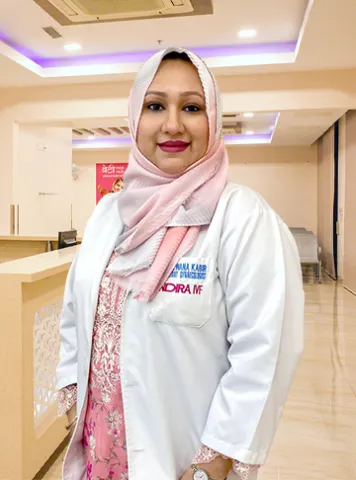Introduction to Test Tube Baby
Being a parent is rarely an easy path. It might take a long time for some couples to conceive naturally. For other couples, assisted reproductive technology (ART), like In Vitro Fertilisation (IVF) or ‘test tube baby’, provides a glimmer of hope. Regardless of the name, there is no ‘test tube’, since it simply means to fertilise the egg with sperm outside the human body, usually in a lab dish, and to place the developed embryo into the uterus (as a fertilised egg or an embryo), where it can grow into a happy, healthy baby.
There are a lot of myths about IVF, including questions of safety (Is it safe?), issues of ‘unnatural’ conception (Is it ethical?), or success (Who is successful?). This article aims to put these myths into perspective and provide facts and straightforward information.
What Is a Test Tube Baby?
A test tube baby, which is a term commonly used in the medical field for an In Vitro Fertilisation (IVF) baby, is conceived using a clinically controlled technique outside the woman’s body. This is a great assisted reproductive technology that has given hope to many infertile couples by conceiving a pregnancy using assisted means.
Here is how it works:
- Mature eggs are collected from the woman’s ovaries.
- The eggs are fertilised with sperm in a culture dish.
- After fertilisation, embryos are monitored for a few days.
- One or more healthy embryos are transferred into the uterus.
The entire process is similar to natural conception — however, it's occurring in the lab under medical expertise.
How Does the Test Tube Baby Process Work?
IVF (In Vitro Fertilisation), sometimes known as ‘test tube baby process’, is a five-step medical procedure used to help couples conceive after they have tried every natural technique.
Step 1 - Ovarian Stimulation
This involves stimulating the ovaries to produce more eggs. The woman will be administered fertility hormones to stimulate the ovaries to produce multiple eggs rather than just one, therefore enhancing the likelihood of success. To induce ovulation, your doctor will inject a kind of human chorionic gonadotropin (hCG) after determining that the follicles' size and quantity are ideal.
Ovulation is induced 36 to 38 hours after the hCG injection, and the eggs must develop before they may be removed.
Step 2 - Egg Retrieval
The IVF procedure will proceed to egg retrieval in around two days following the trigger injection. In order to recuperate from the anaesthesia, you might need to stay in the hospital for a few hours following this treatment.
Step 3 - Sperm Collection and Fertilisation
On the same day as egg collection, the male partner will need to provide sperm samples so that there is no delay in fertilisation of the eggs. The sample will be tested for motility and viability of sperm to provide the best sperm sample for fertilisation.
Step 4 - Embryo Culture
On the day following the egg and sperm combination, they will be checked to see if fertilisation has occurred. The newly fertilised eggs will then be cultured to the embryo stage in the laboratory until Day 5.
Step 5 - Embryo Transfer
The highest quality embryo is transferred to the woman’s uterus through a simple surgical procedure. The embryo transfer will typically occur five days after eggs were collected. A very fine catheter is introduced through the woman's vagina and cervix through which the blastocyte will be transferred into the uterus.
Who Needs a Test Tube Baby?
The test-tube baby treatment is usually recommended under the following circumstances:
- Women with blocked or damaged fallopian tubes - Normally, eggs travel from the ovaries to the uterus via the fallopian tubes. If both tubes have been damaged or blocked, the eggs cannot be fertilised or reach the uterus.
- Men with low sperm count or poor motility - If the male partner is diagnosed with low sperm count or poor sperm quality, a test tube pregnancy would be the best option.
- Couples with ovulation disorders - The sporadic or void egg production places fewer eggs at disposal for sperm to fertilise.
- Cases of unexplained infertility - These are occasions when the testing fails to provide any reason for infertility.
- Older couples trying to conceive naturally without success - Fertility declines with age, so IVF offers some assistance to older couples who've been unable to conceive naturally.
- Individuals with a known risk of genetic disorders looking for embryo screening - IVF will be useful in embryo screening, a step which helps prevent inherited genetic diseases from being passed to the child.
Factors That Affect the IVF Success
A few factors affect the probability of a successful IVF cycle. The factors are as follows:
- Age of the woman : In their late 20s to early 30s, women tend to have the highest success rate of IVF due to the good egg quality and quantity. Fertility begins to decline after 35, and the decline becomes more significant after 40.
- Egg and sperm quality : If eggs are healthy and spermatozoa are motile, the potential of fertilisation and embryo development greatly rises.
- Underlying health conditions : Any hormonal disturbances, thyroid deficiency, or uterine abnormality will also influence the outcome.
- Lifestyle choices : Smoking, alcohol consumption, a poorly nutritious diet, and stress - all can lower the chances of success.
- Number of IVF cycles attempted : The more the number of cycles attempted, the higher the probability of success because the treatment is fine-tuned over time.
Advantages of Test Tube Baby Treatment
- Effective for Long-Term Infertility : This renders hope to couples who are unable to conceive naturally, even after years of trying.
- Genetic Screening Available : Pre-implantation Genetic Testing (PGT), a part of IVF, can screen embryos for inherited disorders.
- Chance at a Biological Child : Couples can still have a child genetically related to them.
- Controlled Fertilisation : Increases the chances of success through monitored and assisted conception.
- Safe and Widely Practised : Well accepted and bettered throughout the world with a proven success rate.
Risks and Disadvantages
- Physical and emotional stress : IVF can be mentally taxing and physically demanding because of hormone treatments, clinic visits, and all the waiting.
- Possible side effects from medications : Hormonal injections may cause bloating in some; mood swings, headaches, and mild discomfort can be felt by some.
- Risk of ovarian hyperstimulation syndrome (OHSS) : Rarely, but with fertility drugs, the ovaries may overreact and cause pain and swelling.
- Chance of multiple pregnancies : The chance of twins or triplets increases when more than one embryo is transferred, and they also pose greater pregnancy risks.
- High financial cost : IVF treatment could be expensive and many a time this adds to the emotional and financial burden.
Cost of a Test Tube Baby
The cost of IVF can vary depending on the following:
- The medical condition being treated
- Number of cycles required
- Use of advanced techniques (e.g. ICSI, embryo freezing, etc.)
- Consultation fees and medications
| Cost Component | Details |
|---|---|
| Initial Consultation | May include diagnostic tests |
| IVF Cycle | Covers stimulation, egg retrieval, and embryo transfer |
| Medications | Hormone injections and supplements |
| Additional Procedures | PGT, ICSI, Post-IVF care |
It’s advisable to consult a fertility expert for a personalised cost breakdown. Some centres may also offer payment plans.
Tips to Prepare for IVF
- Follow a healthy and balanced diet : Food items that are nutritious can help maintain hormonal balance and benefit the reproductive health of both partners.
- Engage in regular, moderate physical activity : Gentle workouts such as walking and yoga keep weight in check and reduce stress levels.
- Avoid harmful substances : Stay away from smoking, alcohol, and excess caffeine as they may negatively impact fertility.
- Take care of your emotional well-being : Practice relaxation techniques, join a support group, or consider counselling to stay mentally strong.
- Communicate openly with your doctor : Being well informed and asking questions leaves you feeling confident throughout your treatment.
Conclusion
IVF or test tube babies have brought joy to hundreds of couples globally. IVF, like many aspects of science, is considered quite advanced, while still being mindful of the emotional experience of the pain of infertility. It represents a glimmer of hope with proper medical assistance and healthy thinking.
For individuals and couples in Bangladesh, access to safe, quality and ethical fertility-based healthcare is extremely important. You must choose a clinic that you have trust in, and then, proceed with confidence, and preferably with an open mind, as you utilise assisted reproductive technology.
Frequently Asked Questions
How is a test tube baby different from a normal baby?
How safe is the test tube baby process?
Can I get pregnant in the first IVF attempt?
Are there age limits for this procedure?
Is a test tube baby procedure painful?
Table of Contents
- Introduction to Test Tube Baby
- What Is a Test Tube Baby?
- How Does the Test Tube Baby Process Work?
- Who Needs a Test Tube Baby?
- Factors That Affect the IVF Success
- Advantages of Test Tube Baby Treatment
- Risks and Disadvantages
- Cost of a Test Tube Baby
- Tips to Prepare for IVF
- Conclusion
- Frequently Asked Questions
Meet Top Fertility Specialists in Bangladesh at Indira IVF

Dr. Umme Ruman
Chief Infertility Specialist, MBBS(DU), FCPS(Obstetrics and Gynaecology), Fellowship in Assisted reproduction
Dr. Umme Ruman is a BMDC-registered infertility specialist based in Dhaka. She holds advanced qualifications in assisted reproductive techniques, sexual and reproductive medicine. Dr. Ruman serves as a Chief Consultant at Indira IVF Dhaka, helping patients with personalised fertility care based on her vast experience and expertise. Her knowledge and compassion will support couples navigating reproductive health challenges and guide them effectively towards their parenthood dreams.

Dr. Rezwana Kabir
IVF specialist, MBBS (SSMC), MS (Obstetrics and Gynaecology), Fellowship in Assisted reproduction
Dr. Rezwana Kabir is a BMDC-registered specialist in obstetrics and gynaecology, and now a part of Indira IVF’s team of fertility specialists in Bangladesh. She combines medical proficiency with a patient-centric approach, offering tailored solutions to couples seeking fertility assistance. She is committed to helping individuals confidently navigate the journey to parenthood through ethical, empathetic, and evidence-based care.
.


